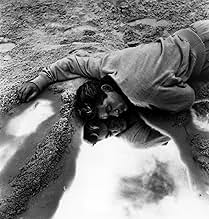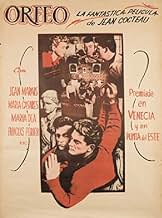ÉVALUATION IMDb
7,8/10
14 k
MA NOTE
Un poète fasciné par la Mort suit sa femme malheureuse, jusqu'aux enfers.Un poète fasciné par la Mort suit sa femme malheureuse, jusqu'aux enfers.Un poète fasciné par la Mort suit sa femme malheureuse, jusqu'aux enfers.
- Nominé pour le prix 1 BAFTA Award
- 2 nominations au total
André Carnège
- Judge
- (as Maurice Carnège)
Paul Amiot
- Judge
- (uncredited)
Philippe Bordier
- Young Man at Café des Poètes
- (uncredited)
Claude Borelli
- Une bacchante
- (uncredited)
Jean Cocteau
- Narrator
- (voice)
- (uncredited)
Histoire
Le saviez-vous
- AnecdotesThe opening scenes set in the Cafe des Poetes were originally set to be filmed with regular extras. However, Cocteau found them to be too self-conscious and artificial so they were all dismissed. Instead, real bohemians from Paris' real café culture were drafted in. These proved to be so natural and relaxed with the café setting, they actually stayed on for two extra days after filming had finished, just hanging out in the cafés that the film crew had been using.
- GaffesWhen Orphée is shot, the gun falls near his right foot. However when Heurtebise picks up the gun; the orientation changes and it is now near his right hand.
- Citations
Heurtebise: I am letting you into the secret of all secrets, mirrors are gates through which death comes and goes. Moreover if you see your whole life in a mirror you will see death at work as you see bees behind the glass in a hive.
- ConnexionsEdited into Histoire(s) du cinéma: Une histoire seule (1989)
- Bandes originalesDance of the Blessed Souls -- from Orphée et Eurydice
Written by Christoph Willibald Gluck
Commentaire en vedette
It was fantastic that I got to see this film, yet odd that it had to be from the video selection of my English faculty library. So, headphones it was, on a typically cold English February day, in a place of learning.
I quickly took to this spirited, ambitious film; a heady concoction that blends fantasy and reality beautifully. This is truly one of the aesthetically wondrous films one could ever wish to see... it has a visual poetry that beguiles the eye, as well as the verbal poetry of a fine script. This is a Cocteau film in which he goes a bit deeper into his characters; while the acting is 'stagy' (in quite an appealing manner) the use of location firmly grounds the piece in an initial contemporary, provincial French town. Cocteau's camera takes in all that is necessary and no more, in conveying his lucid dream visions. That the realism so convinces, in its way of establishing a sleepy, unremarkable French town, really helps the fantasy to come across within a richly plausible context.
Many touches seem audacious and visionary - the very fact of translating this ancient myth to contemporary France, the brilliant device of having Orpheus enraptured by at times otherworldly, at times mundane messages conveyed through a crackling car radio... the imagery of a mirror turning watery as it is passed through; this is sublime, artful stuff, of a heavily metaphysical, cerebral yet enjoyable nature. Maria Casares is absolutely splendid as the "Princess", an aspect of Death; beautifully sleek and stern, with a suppressed tenderness brought out later in the film. Casares brilliantly conveys the sense of a timeless creature of the ages, despite her being only in her 27th year when it was made. Jean Marais is wonderfully theatrical in his acting; a good portrayal of the flawed artist - in this case 'poet', chasing after inspiration rather than worldly happiness. The overlaps with Cocteau himself, autobiographically, add a little extraneous interest... certain scenes seem to refer to Cocteau's position in France, and interestingly also the occupation, with the leather clad motor-cyclists and absurdist underground tribunals...
I should mention the character Heurtebise, treated deftly by Cocteau; who seems to find most to relate to in his male leads, Orpheus and Heurtebise. While the very feminine Death is portrayed exceptionally, Maria Dea's Eurydice is I feel, seen as quite insignificant, though Dea does her best. It's a shame Juliette Greco gets such short shrift in her role as Aglaonice; much is hinted at early on, regarding her antagonistic character, that is not followed up. Francois Perier is wonderful as Heurtebise; along with Casares the most memorable performance here. Perier really makes you believe in and sympathize with this character, as well as having a matter-of-fact eccentricity comparable to Marius Goring's Conductor in "A Matter of Life of Death".
Auric and Hayer do a superb job fine-tuning and moulding Cocteau's tantalizing vision of art, death and love. The film is technically brilliant, the trick shots superbly pulled off and the atmosphere always compelling, involving the viewer, despite the latent abstract quality of the film.
This really is a film to lose yourself in; a lyrical feat of visual poetry with the majestic sense of dream. It is film fantasy as it all too seldom has been; sublimely imaginative and fluidly inventive.
Rating:- **** 1/2/*****
I quickly took to this spirited, ambitious film; a heady concoction that blends fantasy and reality beautifully. This is truly one of the aesthetically wondrous films one could ever wish to see... it has a visual poetry that beguiles the eye, as well as the verbal poetry of a fine script. This is a Cocteau film in which he goes a bit deeper into his characters; while the acting is 'stagy' (in quite an appealing manner) the use of location firmly grounds the piece in an initial contemporary, provincial French town. Cocteau's camera takes in all that is necessary and no more, in conveying his lucid dream visions. That the realism so convinces, in its way of establishing a sleepy, unremarkable French town, really helps the fantasy to come across within a richly plausible context.
Many touches seem audacious and visionary - the very fact of translating this ancient myth to contemporary France, the brilliant device of having Orpheus enraptured by at times otherworldly, at times mundane messages conveyed through a crackling car radio... the imagery of a mirror turning watery as it is passed through; this is sublime, artful stuff, of a heavily metaphysical, cerebral yet enjoyable nature. Maria Casares is absolutely splendid as the "Princess", an aspect of Death; beautifully sleek and stern, with a suppressed tenderness brought out later in the film. Casares brilliantly conveys the sense of a timeless creature of the ages, despite her being only in her 27th year when it was made. Jean Marais is wonderfully theatrical in his acting; a good portrayal of the flawed artist - in this case 'poet', chasing after inspiration rather than worldly happiness. The overlaps with Cocteau himself, autobiographically, add a little extraneous interest... certain scenes seem to refer to Cocteau's position in France, and interestingly also the occupation, with the leather clad motor-cyclists and absurdist underground tribunals...
I should mention the character Heurtebise, treated deftly by Cocteau; who seems to find most to relate to in his male leads, Orpheus and Heurtebise. While the very feminine Death is portrayed exceptionally, Maria Dea's Eurydice is I feel, seen as quite insignificant, though Dea does her best. It's a shame Juliette Greco gets such short shrift in her role as Aglaonice; much is hinted at early on, regarding her antagonistic character, that is not followed up. Francois Perier is wonderful as Heurtebise; along with Casares the most memorable performance here. Perier really makes you believe in and sympathize with this character, as well as having a matter-of-fact eccentricity comparable to Marius Goring's Conductor in "A Matter of Life of Death".
Auric and Hayer do a superb job fine-tuning and moulding Cocteau's tantalizing vision of art, death and love. The film is technically brilliant, the trick shots superbly pulled off and the atmosphere always compelling, involving the viewer, despite the latent abstract quality of the film.
This really is a film to lose yourself in; a lyrical feat of visual poetry with the majestic sense of dream. It is film fantasy as it all too seldom has been; sublimely imaginative and fluidly inventive.
Rating:- **** 1/2/*****
- HenryHextonEsq
- 4 févr. 2003
- Lien permanent
Meilleurs choix
Connectez-vous pour évaluer et surveiller les recommandations personnalisées
- How long is Orpheus?Propulsé par Alexa
Détails
- Durée1 heure 52 minutes
- Couleur
- Rapport de forme
- 1.37 : 1
Contribuer à cette page
Suggérer une modification ou ajouter du contenu manquant
































